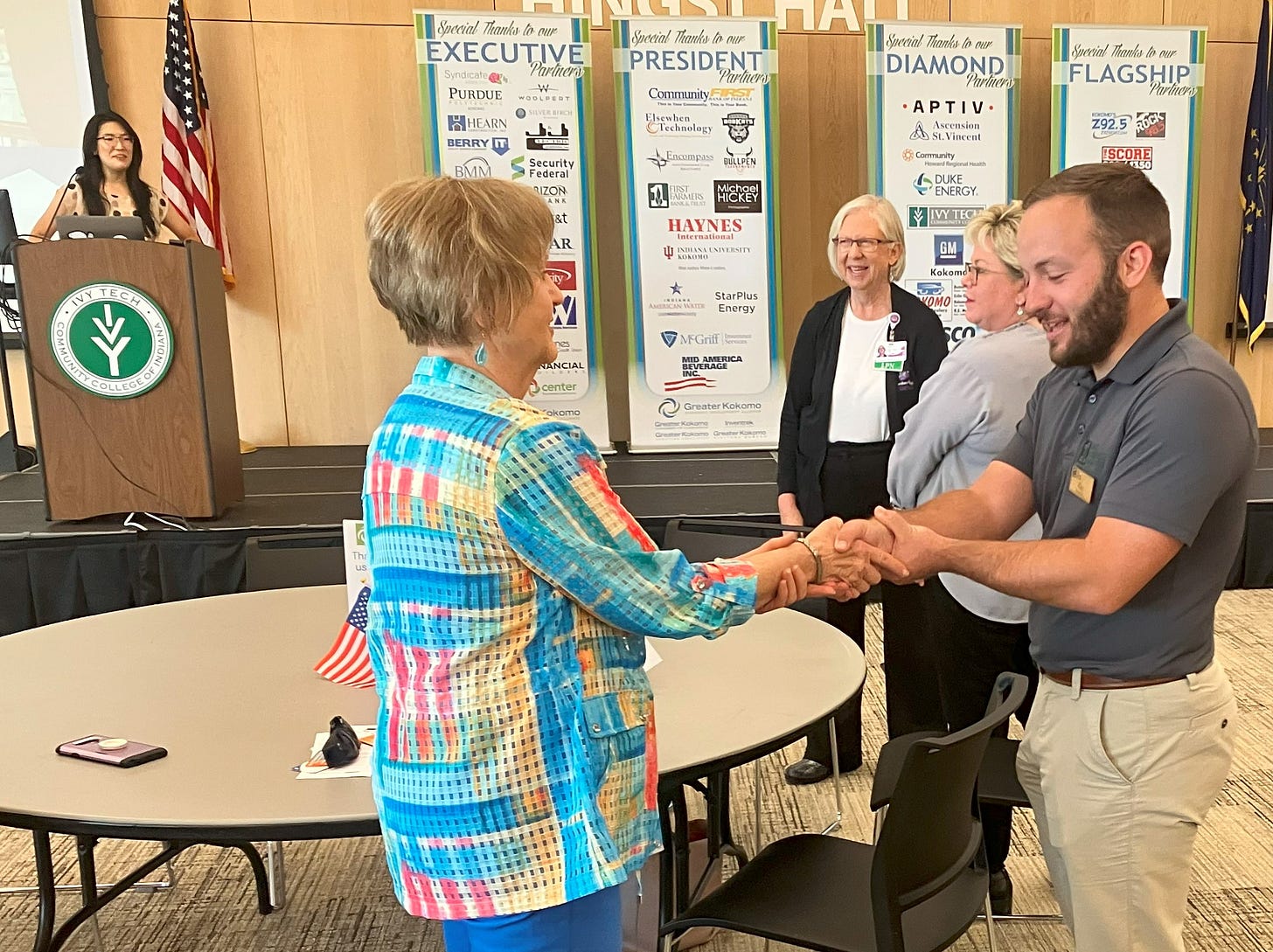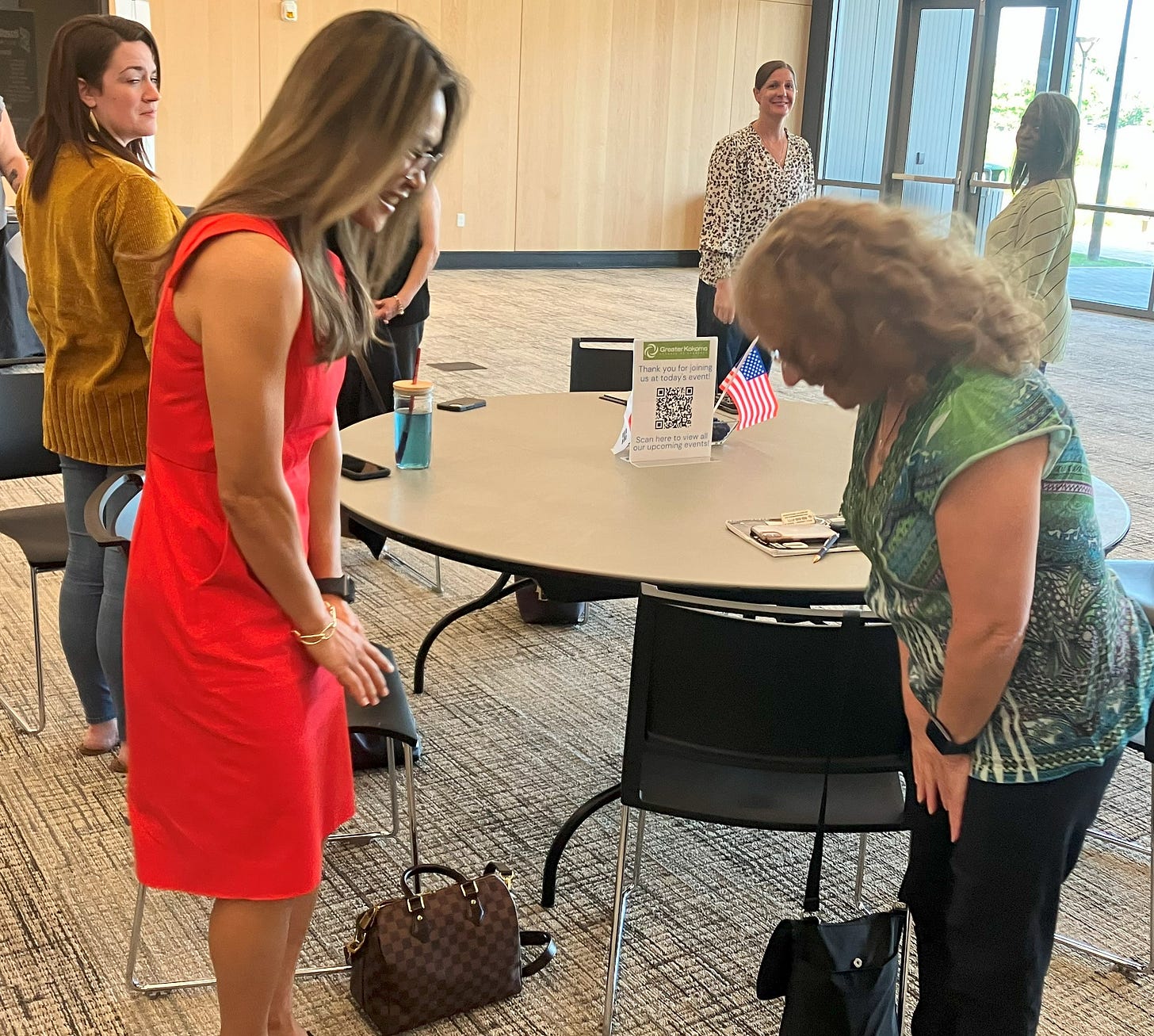Getting ready for Korea
Greater Kokomo holds final cultural integration class; also, state legislators looking for interns
This article is brought to you by the Kokomo Family YMCA. Grab a paddle and your teammate for the YMCA's first annual Pickleball Tournament on Oct. 28 at 8 a.m.! This doubles tournament is for ages 18 and older. You are welcome to bring your own paddles and indoor pickleballs. All proceeds will go towards the YMCA’s Annual Campaign. For more information, visit: https://kokomoymca.org/events/pickleball-tournament/
A slight bow is appropriate when greeting a South Korean. Handshakes use both hands. Small, thoughtful gifts show respect. How one hands something to a South Korean is important. And food is at the center of social and professional interaction.
This time next year, Kokomo will be home to as many as 1,000 South Korean nationals. An entire culture will be introduced that may seem drastically different than American life. To prepare for this change, the Greater Kokomo Economic Development Alliance hosted a series of cultural integration seminars across the spring and summer.
From kimchi to Karaoke, there is plenty to learn about Korean culture. With the help of Sooyeon Shin of Moyars Consulting, a native South Korean who grew up in the U.S., business, government, and community leaders got a taste of what to expect when the StarPlus Energy battery plant nears its launch.
“What Kokomo has been doing, preparing the community for all the Korean nationals that are going to be coming to Kokomo, is super-proactive,” said Shin. “You are really caring to make this work and to be as smooth as possible for both ends. It has been such a great opportunity to be a part of it.”
The final seminar was held on Aug. 29, and it served as a review of the previous meetings. Shin covered the most important cultural differences that need to be understood. At the top of that list is respect.
“We like to respect our authority and respect our elderly,” said Shin. “So, a common way of showing respect is bowing.”
Shin explained the decorum used for a bow. The younger or subordinate person should bow first, though the elder doesn’t have to wait for the bow to be complete before returning the gesture. The bow doesn’t have to be deeper than 15 degrees or so.
South Koreans are very social people. The idea of belonging to a group or team or family is very important to them. Shin said that work colleagues enjoy spending time together away from the workplace. They dine together. They gather after work for parties and activities.
“It’s a collective mindset,” said Shin. “Korea is a very small country in Asia. We're divided on a tiny part of a peninsula in the Pacific Ocean, and we have been invaded many times. So, we kind of have a mindset that if you're Korean, you're one of us. We lean towards that sense of belonging. We focus more on groups rather than individuals.”
That groupthink attitude changes when it comes to making business decisions, however. Where many American offices value input from every employee and meet collectively to make decisions, in South Korea those plans come from the top.
“There's more of a centralized decision-making process than group discussion,” said Shin. “In America, you prefer to have a roundtable discussion and come up with the solution. In a Korean work setting, many times the decisions will be coming down from top down.
“This may be very traditional Korean thinking, and it's changing with the new generation. But this is the foundation of our business.”
Koreans also don’t take things slow. Speed is highly valued in every aspect of Korean life. Known as “ppalli, ppalli” culture, it means to hurry in all things.
“You’ll see a lot of Koreans walking fast,” said Shin. “We have that ‘hurry, hurry’ mindset. We like to get things done fast so we can go home faster. We like to not waste time.”
But the greatest contrast in the two cultures manifests at the dinner table. During the work day, colleagues eat lunch together. It is not uncommon for an office manager to take the entire staff to dinner after work. And at the table, this collectivity continues.
Meals are served “family style,” as an American might describe it. While everyone at the table has their own plate and bowl of rice, the entrees and sides are served on single dishes, and everyone serves themselves from them.
Serving oneself doesn’t carry over to beverages, however. Shin explained that it is common and proper for someone else at the table to fill a diner’s glass, especially when it comes to alcohol.
“We like to eat in groups, and we like especially work lunches,” said Shin. “You see a lot of co-workers dining together. It won't hurt to go out and get to know another during your meal. And food is such a big component of our culture. It's a communal dining experience where you'll have your own bowl of rice and sometimes soup, but you'll see a lot of side dishes in cute little dishes that are up for grabs for anybody at the table.”
The Korean integration seminars were organized by the Greater Kokomo Economic Development Alliance with sponsorship by Security Federal Savings Bank and the Community Foundation of Howard County.
Kokomo legislators seek Statehouse interns for 2024 session
State Reps. Mike Karickhoff (R-Kokomo) and Heath VanNatter (R-Kokomo) are seeking interns to join them at the Statehouse during the 2024 legislative session.
According to Karickhoff, House interns will be paid $900 bi-weekly as they work in downtown Indianapolis during session, which starts in January and concludes mid-March.
"The House Republican Internship Program can provide a stepping stone for young professionals preparing for the workforce," Karickhoff said. "Many interns use the experience to jumpstart their careers and join our team as a full-time staff member at the Statehouse, or work with other government agencies or land jobs in the private sector."
VanNatter said House internships are open to college students and recent graduates of all majors.
"As a small business owner, I know employers value and look for candidates with on-the-job experience," VanNatter said. "This internship sets applicants apart from their peers and can lead to full-time jobs."
Paid, spring semester intern positions are full-time, Monday through Friday, and include free parking, career and professional development assistance, enrollment access to an Indiana government class, and opportunities to earn academic credits through the student's college or university. Interns are also eligible to apply for a competitive $3,000 scholarship to use toward undergraduate and graduate expenses.
Students can apply for internships in a variety of departments related to their field of study, including legislative operations, policy, and communications and media relations.
Applications are available online at indianahouserepublicans.com/internship and are due by Oct. 31.









